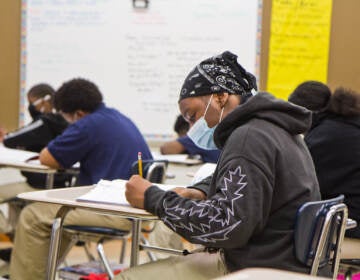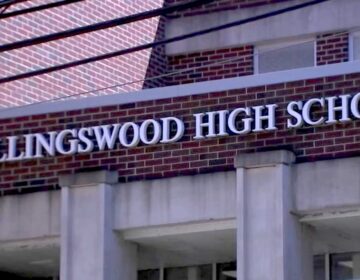It’s opening day for expanded Philly pre-K
ListenA year after Jim Kenney was sworn in, the Philadelphia mayor’s signature initiative has lifted off.
Except for the chilly weather and the television cameras, Wednesday morning at SPIN preschool in Northeast Philadelphia felt like any other first day of school.
Children nervously looped their backpacks on hallway hooks as parents kissed them goodbye. Teachers dashed between little ones overcome with anxiety and others jolted into hyperactivity by the volume of new toys.
It was a joyous, noisy, confusing morning — and it was made possible by the soda-drinking denizens of Philadelphia.
That last part explains the cameras.
The dozens of 3- and 4-year-olds who started at SPIN on Wednesday are part of PHLpreK, Philadelphia’s city-sponsored early childhood program. The initiative bowed just a year after Kenney was sworn into office, fulfilling — at least in part — one of his signature campaign promises.
“I just can’t believe that one year ago we were getting started, and here we are today,” said Otis Hackney, who heads the Mayor’s Office of Education.
Kenney lobbied City Council to pass a tax on sweetened beverages over the summer, vowing to spend some of the money on a new pre-K program for city children. With the 1.5-cents-per-ounce sweetened beverage tax now in effect, the city can officially fund 2,000 new, high-quality pre-K seats. Another 1,000 slots will be available in September, with officials promising 6,500 seats in all by the time the program reaches full scale.
City leaders hope that by providing pre-K access to more students they can improve kindergarten readiness, alleviate the cost of child care for young families, and ultimately produce young adults who are better prepared for the high-skill jobs of the 21st century.
“Being ready for learning, pre-K really sets the table for that,” Hackney said.
SPIN parent Nafesa Bakhteri is now sending her fifth child through pre-K. Her oldest now attends Central High School, one of the city’s academic magnet schools, and she credits early childhood education for jump-starting his academic success.
“It does help a lot because it’s the foundation of what they learn,” Bakhteri said. While school was closed for winter break, she said her kids spent entirely too much time playing video games.
Her youngest, 3-year-old Fatima, had grown bored watching television at home. Now that she’s enrolled in pre-K, she can learn with other children, freeing her mom to churn through all the other responsibilities that come with raising a big family.
“It’s so good that my mind is free. She’s in a safe place. She’s learning while I’m doing my housework,” said Bakhteri.
PHLpreK open to all
Of the 2,000 seats made available on Wednesday, not all will be filled on day one. About 2,100 families have at least started the application process for PHLpreK, Hackney said. Of those, 1,500 have completed their applications and more than 1,000 have enrolled at an actual site.
The city expects all 2,000 seats will be filled by the end of the month, Hackney said. He added that the city says has received 3,500 inquiries so far on its PHLpreK hotline number.
“We’re still encouraging people to call the call center,” said Hackney. “Even though we do have a number of people in the pipeline, developing those waiting lists is important because opportunities will present themselves for families moving forward.”
The city pre-K subsidy provides $8,500 per child per year. It’s enough money for sites such as SPIN to offer programming five days a week from 8:30 in the morning to 2 in the afternoon.
Like many other child care facilities, SPIN also provides “wrap-around services” that allow children to stay at the site from 7 in the morning until 6 at night. Eligible families can pay for that extra time through a state-run child care subsidy program. Those who don’t meet the income threshold have to pay $900 per month for the added hours.
Part of what distinguishes PHLpreK from other child care and pre-K subsidy programs is the lack of an income-eligibility requirement. Most children in the federal Head Start program, for instance, must come from families living at or below the federal poverty level. The SPIN facility in Northeast Philadelphia has 80 children funded through the state-run Pre-K Counts program, available to families making no more than three times the federal poverty guidelines.
PHLpreK, meanwhile, is open to anybody. Katie Dougherty, SPIN’s corporate officer of children’s services, said the city-subsidized program will make pre-K affordable for some families who earn just a little too much to qualify for state or federal assistance.
City officials, however, have said in the past that it will focus on expanding pre-K in areas where there’s a dearth of available seats and a high proportion of children living in poverty.
WHYY is your source for fact-based, in-depth journalism and information. As a nonprofit organization, we rely on financial support from readers like you. Please give today.












